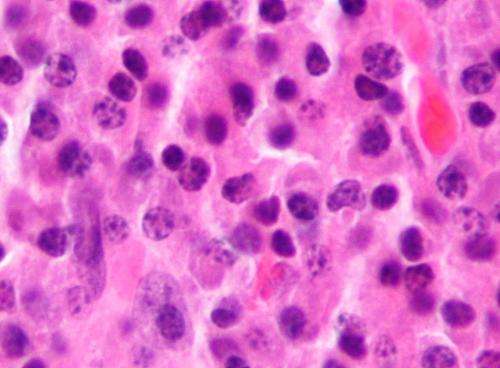This article has been reviewed according to Science X's editorial process and policies. Editors have highlighted the following attributes while ensuring the content's credibility:
fact-checked
peer-reviewed publication
trusted source
proofread
Cancer expert highlights advancements in treating multiple myeloma

March is Myeloma Awareness Month, and Sikander Ailawadhi, M.D., hematologist/oncologist at Mayo Clinic Comprehensive Cancer Center, shares details about new advancements in research leading to better outcomes for patients with multiple myeloma.
Multiple myeloma is a relatively uncommon form of blood cancer in the bone marrow that affects less than 1% of the U.S. population, according to the American Cancer Society. While there is no cure, the disease can be treated with medication, chemotherapy, radiation and even bone marrow transplant to help extend the quality of life for patients.
Dr. Ailawadhi is co-leading a team of researchers at Mayo Clinic looking at chimeric antigen receptor therapy, also known as CAR-T cell therapy, to treat patients with multiple myeloma, and the development of new drugs to target various cancer-specific markers, including B-cell maturation antigen (BCMA) and others.
"Advancements with new medications and therapies for treating myeloma are continuously evolving and changing. This is an exciting time to be researching cancer medicine to identify new therapies that will provide hope for patients with cancer," says Dr. Ailawadhi.
CAR-T cell therapy is a cutting-edge cancer immunotherapy that involves genetically modifying T cells to make them specific for cancer cell markers and activates the immune system to recognize and destroy cancer cells.
In a recently published study in the New England Journal of Medicine, researchers compared CAR-T cell therapy to the currently available standard treatment regimens for patients previously treated for multiple myeloma in whom the disease returned after treatment. The researchers measured progression-free survival rates, defined as the time during and after treatment that a patient lives with the disease, but it did not get worse.
The study showed that at a median patient follow-up of 18.6 months, the median progression-free survival from the cancer was 13.3 months in the group treated with CAR-T cell therapy, compared to only 4.4 months in the standard-regimen group.
"These findings show that we are moving in the right direction toward practice-changing research that would provide CAR-T cell therapy earlier during treatment of patients with relapsed multiple myeloma—something that will hopefully be standard of care in the future," adds Dr. Ailawadhi.
Mayo Clinic researchers continue to test new drugs targeting multiple myeloma as dedicated teams lead clinical trials using new CAR-T cell therapy platforms. These include off-the-shelf and using CAR-T cell therapy treatments earlier in the treatment journey for patients.
More information: Paula Rodriguez-Otero et al, Ide-cel or Standard Regimens in Relapsed and Refractory Multiple Myeloma, New England Journal of Medicine (2023). DOI: 10.1056/NEJMoa2213614



















